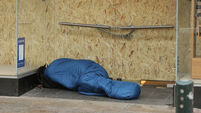'Too many volunteers' providing hot food to homeless leaving unmet needs in other areas

A new report said the HSE and FSAI may need to be involved in managing the growth in on-street provision of food to homeless people by volunteers. Picture: Sasko Lazarov/RollingNews.ie
A new report suggests there may be too many volunteer groups in Dublin providing hot food to people who are homeless, while there are unmet needs in other areas.
It also said the HSE and FSAI may need to be involved in managing the growth in on-street provision of food to homeless people by volunteers.













